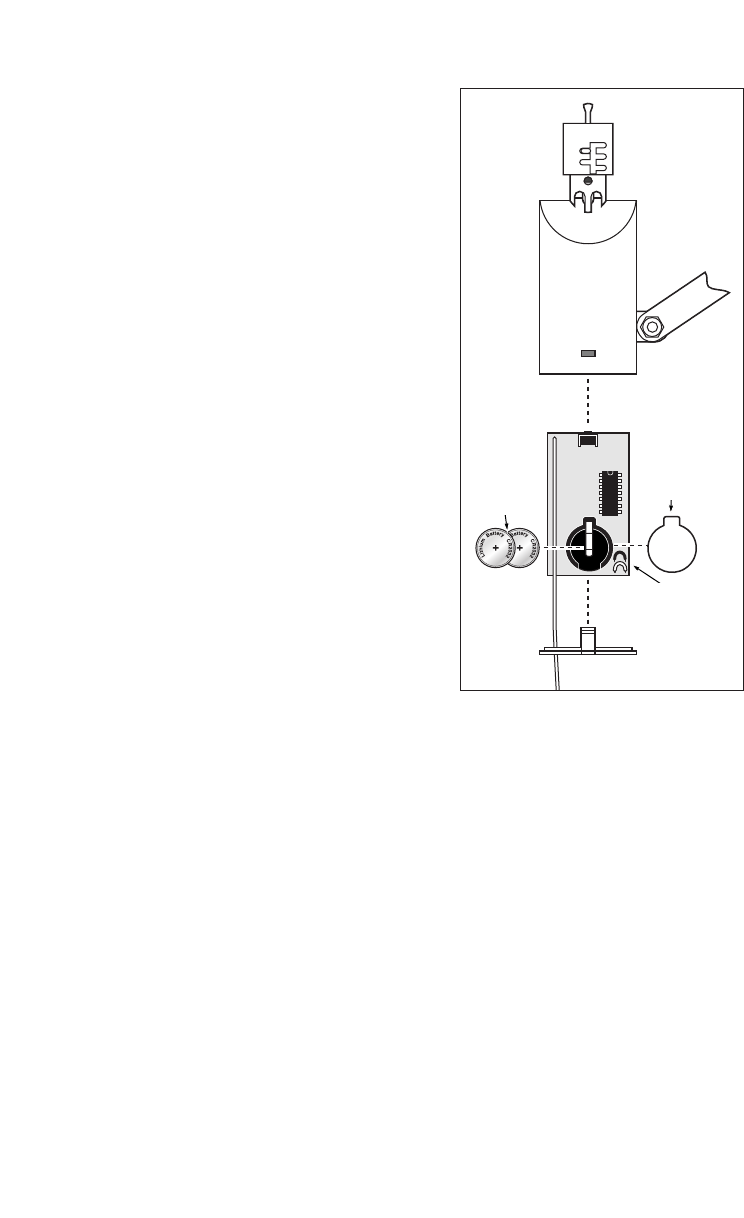
Sensor/Transmitter Battery Replacement
1. Remove the bottom housing cover of the
Sensor/Transmitter by gently pressing in and
down on the lower opposing tabs using a small
flat-blade screwdriver, then carefully slide the
circuit board out. See
Figure 9.
2. Remove the battery cover and batteries.
Replace using two 3V CR2032 (or equivalent)
batteries. Install with positive (+) side of the
batteries facing up.
Note: Properly dispose of used batteries per
the battery manufacturer’s recommendations.
3. Reassemble the unit in reverse order.
Changing the Sensor/Transmitter Code
The transmission code of Wireless RainSensor
system is identified by stickers located on the
Sensor/Transmitter and Receiver. Although, in
most cases, even if two identical units are
installed, unwanted activations would only occur if
the two Sensor/Transmitters were set for different
rainfall amounts. However, the code may be man-
ually changed as follows:
1. Remove the bottom cover of the
Sensor/Transmitter by gently pressing in and
down on the the lower opposing tabs using a
small flat-blade screwdriver, then carefully slide
the circuit board out. See
Figure 9.
2. Identify the code wire loops (small black wire
and white wire loops) and cut one or both loops using end-cutting pliers.
3. Reassemble the Sensor/Transmitter and follow the procedures provided in
“Receiver Learn Mode” on page 9.
Troubleshooting
Signal Indicator (Installation Validation
TM
)
The Signal Indicator provides instant signal strength feedback for the installer. The
indicator always shows the strength of the last signal received. In order to clear this
signal, simply press the Smart Bypass button once; pressing the button again will exit
the bypass mode.
Solving Reception Problems
The Wireless RainSensor operates under Part 15 of the FCC rules. This means that it
has to comply with certain standards and is only allowed to transmit up to a certain power
level. In rating transmitters of any form, typically a line-of-site value is used in order to
show the relative effectiveness of a transmitter and allow a transmitter and receiver to be
compared to one another using a fair method. The Wireless RainSensor operates up to
300' line-of-site. This means that in an open field, with no obstructions, the
Sensor/Transmitter and Receiver pair will successfully communicate up to 300' apart.
However, in almost all installations, there are obstacles between the Sensor/Transmitter
and Receiver such as walls, floors, etc.
10
Battery
Cover
CR2032
Batteries
Transmitter
Code Wire
Loops
Figure 9














